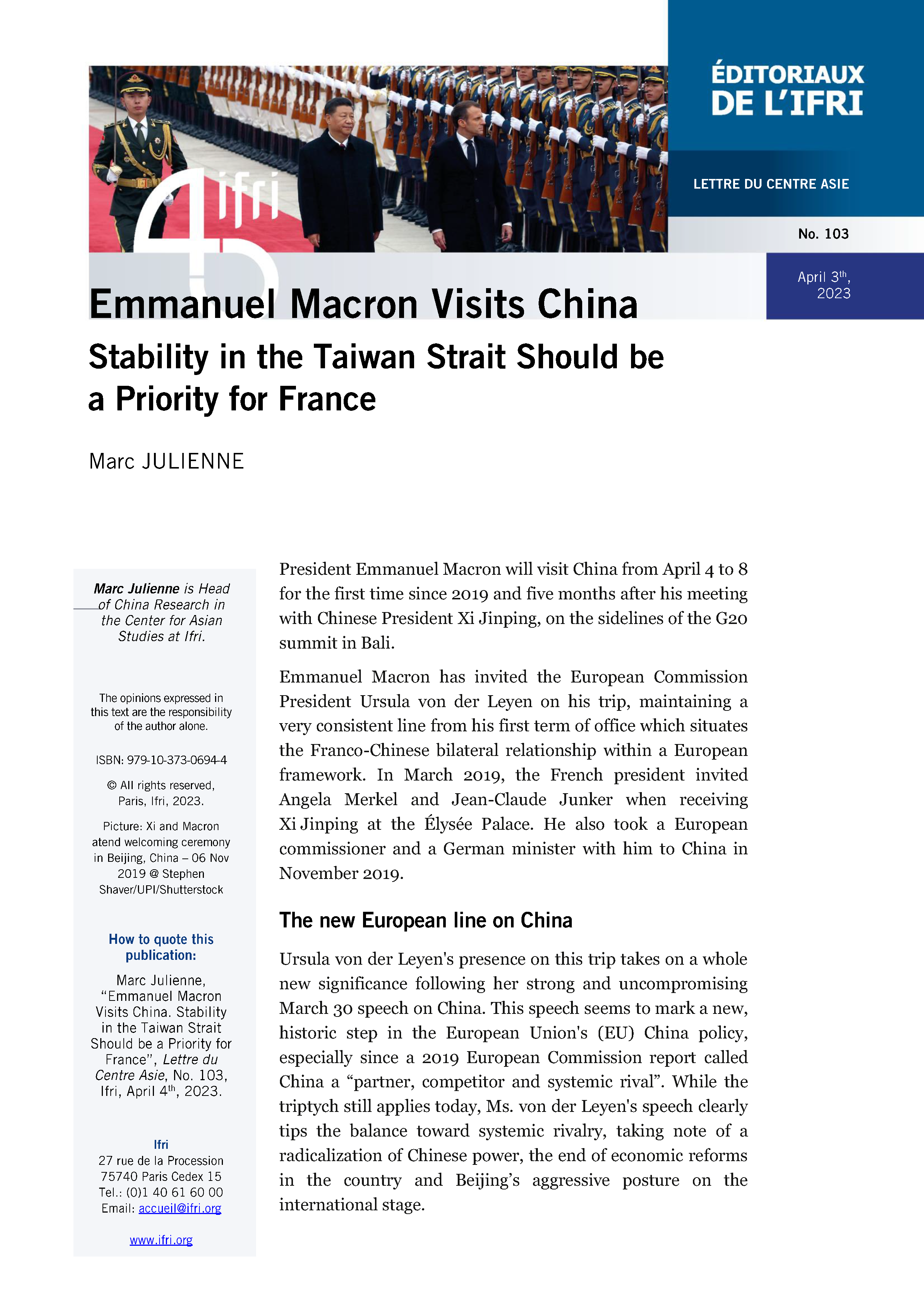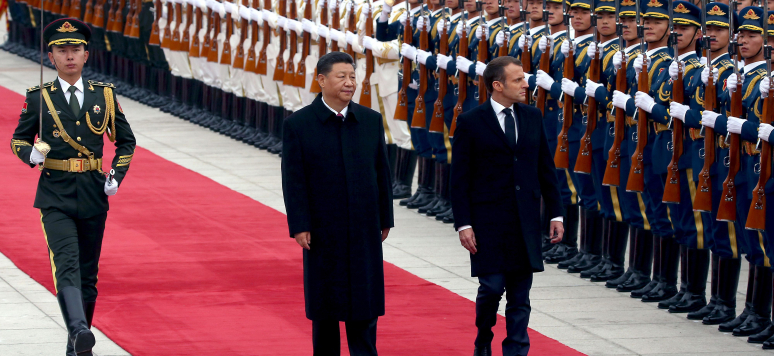Emmanuel Macron Visits China: Stability in the Taiwan Strait Should be a Priority for France

President Emmanuel Macron will visit China from April 4 to 8 for the first time since 2019 and five months after his meeting with Chinese President Xi Jinping, on the sidelines of the G20 summit in Bali.

Emmanuel Macron has invited the European Commission President Ursula von der Leyen on his trip, maintaining a very consistent line from his first term of office which situates the Franco-Chinese bilateral relationship within a European framework. In March 2019, the French president invited Angela Merkel and Jean-Claude Junker when receiving Xi Jinping at the Élysée Palace. He also took a European commissioner and a German minister with him to China in November 2019.
The new European line on China
Ursula von der Leyen's presence on this trip takes on a whole new significance following her strong and uncompromising March 30 speech on China. This speech seems to mark a new, historic step in the European Union's (EU) China policy, especially since a 2019 European Commission report called China a “partner, competitor and systemic rival”. While the triptych still applies today, Ms. von der Leyen's speech clearly tips the balance toward systemic rivalry, taking note of a radicalization of Chinese power, the end of economic reforms in the country and Beijing’s aggressive posture on the international stage.
This new, more lucid line undoubtedly remains far removed from the still very conciliatory approach favored by Emmanuel Macron towards China. Furthermore, Ursula von der Leyen's speech, as well as the statements she will likely make in Beijing, risk highlighting the pusillanimity of the French position. Mr. Macron and Ms. von der Leyen nevertheless agree on an important principle: that of engaging in a policy of “de-risking” in reaction to the exposure of the European economy to certain dependencies on China. De-risking is an alternative to the more radical approach of “decoupling” from China promoted by the United States. As a result, the EU does not align itself with Washington's more offensive position but favors a defensive approach to reduce its dependence on China.
Understanding China's position on Ukraine
As early as November 2022, Emmanuel Macron had announced that he wanted to take the Ukrainian issue to President Xi during his state visit, hoping to entice the latter into a mediating role in the conflict. This misunderstands China's position on Ukraine, a misreading also observed among other European leaders, notably German Chancellor Olaf Scholz and European Council President Charles Michel when they visited Beijing in November and December 2022 respectively.
“China can play, I am convinced, a more important mediating role alongside us in the coming months”, Emmanuel Macron, Bali, November 16, 2022.[1]
As a reminder, China has maintained a posture that is both constant and contradictory since the beginning of the conflict: on the one hand, it claims to be neutral, promoting peace talks and a ceasefire; on the other hand, it avoids taking any concrete initiatives that would create the conditions for these talks, does not recognize Russian aggression and has still not deigned to respond to President Volodymyr Zelensky's many requests for dialogue.
China supports Russia. Its support is political, not military, because the latter is not in Beijing's interest at the moment – Ukraine is not China’s war. Xi's interest today is to display a united ideological front with Russia, useful for his own strategic rivalry with the United States, without questioning his narrative of neutrality, nor exposing himself to sanctions.
From this observation, we understand that we should not count on China to play the role of mediator in the Ukraine war. In fact, it shows no sign of doing so. The Chinese government's 12-point position paper, published on February 24 of this year, claims to propose a “political solution to the Ukrainian crisis” but does not actually put forward any concrete ideas. Moreover, it is hard to imagine how Beijing could be an acceptable mediator for Kyiv without acknowledging Russia’s invasion of Ukraine.
The myth of China as a mediator has probably fizzled out since Xi Jinping's high-profile visit to Moscow in March. The demonstration of “friendship” between Mr. Xi and Mr. Putin has removed any ambiguity about Chinese “neutrality”. To the point that, in Europe, some have moved – rather abruptly – from the perception of Xi Jinping as a potential mediator to Xi Jinping as a potential supplier of arms to Russia. It is no longer a question of convincing Xi to act as a mediator, but of dissuading him from crossing the Rubicon of military support. In either case, it seems to be a lost cause.
The same applies to the issue of tactical nuclear weapons, of which Vladimir Putin has announced the deployment in Belarus. This move is in total contradiction with Chinese doctrine, which opposes the deployment of nuclear weapons in third countries. But China's nuclear doctrine only binds China, and Beijing does not seek to interfere with Moscow's.
For Europeans to see a contradiction in China's posture and an opportunity to engage Beijing in pressuring Moscow would be, again, a misunderstanding of the Sino-Russian relationship. Their partnership is not based on an alignment of their foreign policies, but on respect for each other's positions, even if some of these positions of one are contrary to those of the other.
Stability in the Taiwan Strait: a top priority
President Macron will be right to bring these issues to the attention of the Chinese president because they are priority issues for France and it is important to hold Beijing accountable for its commitments and contradictions. But we should not expect any results on this front.
There is another issue of prime importance for France that Emmanuel Macron would do well to put on the table, and on which he could even obtain some results: stability in the Taiwan Strait.
Of course, this is a sensitive issue for Beijing, which considers Taiwan its “internal affairs”. However, there is no doubt that a crisis in the Strait, regardless of who is responsible, would have direct and significant consequences on French and European companies and economies. This is why it is legitimate and necessary to convey to the Chinese president France's deep concern about the rising tensions in the Taiwan Strait and the need for the entire international community (and thus for Xi himself) to maintain stability and the status quo.
The expression of this deep concern would serve two French interests. In one instance, it would remind Xi Jinping that, whatever the status of Taiwan, a crisis would inevitably be international and that neighboring and European powers would be forced to react in one way or another to safeguard their interests. At the same time, if expressed publicly, this position would reinforce France's fragile credibility in the Indo-Pacific. Indeed, as a self-proclaimed Indo-Pacific power, France cannot remain deaf and mute on the most decisive security issue of the decade, for the region and for the world order. Its credibility with its allies, its partners in the Indo-Pacific and its European partners, most of whom are updating their China policies, including the Commission, is at stake. As a major power in the EU and a member of the United Nations Security Council, France must promote peace and stability in the Taiwan Strait in order to remain credible.
[1]. « Introductory speech from the President of the Republic », Press conference held on the sidelines of the G20 Summit in Bali, November 16, 2022, available at: www.elysee.fr.
Download the full analysis
This page contains only a summary of our work. If you would like to have access to all the information from our research on the subject, you can download the full version in PDF format.
Emmanuel Macron Visits China: Stability in the Taiwan Strait Should be a Priority for France
Related centers and programs
Discover our other research centers and programsFind out more
Discover all our analysesJapan’s Takaichi Landslide: A New Face of Power
Prime Minister Sanae Takaichi has turned her exceptional popularity into a historic political victory. The snap elections of February 8 delivered an overwhelming majority for the Liberal Democratic Party (LDP), driven by strong support from young voters, drawn to her iconoclastic and dynamic image, and from conservative voters reassured by her vision of national assertiveness. This popularity lays the foundation for an ambitious strategy on both the domestic and international fronts.
The U.S. Policy Toward Taiwan Beyond Donald Trump: Mapping the American Stakeholders of U.S.-Taiwan Relations
Donald Trump’s return to the White House reintroduced acute uncertainty into the security commitment of the United States (U.S.) to Taiwan. Unlike President Joe Biden, who repeatedly stated the determination to defend Taiwan, President Trump refrains from commenting on the hypothetical U.S. response in the context of a cross-Strait crisis.

China’s Strategy Toward Pacific Island countries: Countering Taiwan and Western Influence
Over the past decade, China has deployed a diplomatic strategy toward the Pacific Island Countries (PICs). This strategy pursues two main objectives: countering Taiwan's diplomatic influence in the region and countering the influence of liberal democracies in what Beijing refers to as the "Global South."

Opening up the G7 to South Korea to Address Contemporary Global Challenges
The G7’s global influence has diminished as powers like China reshape international governance through initiatives such as BRICS and the Shanghai Cooperation Organisation (SCO). With the G7 now representing just 10 per cent of the world’s population and 28 per cent of global GDP, its relevance is increasingly questioned.











